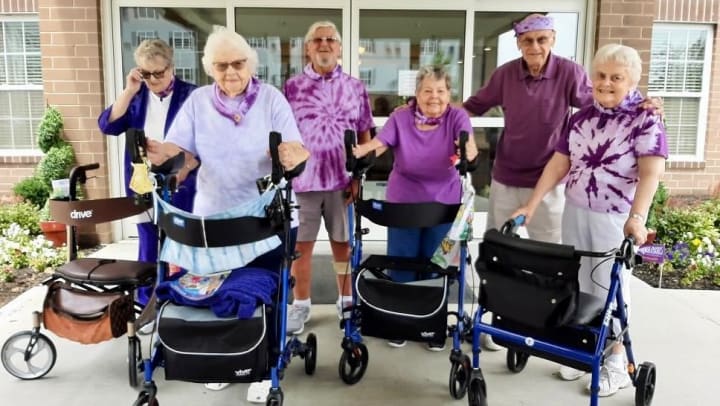Alzheimer’s Awareness Month is observed every September to increase awareness of dementia and Alzheimer’s disease. It was created in 1983 by President Regan, and was intended to educate people about this often misunderstood condition. The Alzheimer’s Society has identified that dementia, and other forms of memory impairment, are among the biggest challenges we face worldwide, with 50 million people living with memory loss and other forms of dementia. This yearly event not only raises awareness, but also reduces the stigma around dementia. During this month, Harmony Senior Services and our communities participate in local Alzheimer’s Association events to show our support for families living with the disease and enduring the difficult decisions and research needed to establish the best care options for their loved ones. We believe that it is not only important to understand Alzheimer’s Disease but to also know the best options for your loved one’s health and safety.
Understanding Alzheimer’s
Alzheimer’s Disease is a type of dementia that affects memory, thinking, behavior, and other cognitive abilities that interfere with daily life. According to the Alzheimer’s Association, the greatest known risk factor is increasing age, with the majority of people diagnosed with the disease being 65 and older. New research suggests that keeping the heart and brain healthy might lower your risk for the disease. This includes having a balanced diet, socializing with friends and family, and exercising regularly. Even though there is currently no cure for Alzheimer’s, there is a worldwide effort to find a way to prevent the disease and spread awareness.
Know the Signs
Oftentimes, individuals notice changes in their memory and cognitive function before their friends, family, or associates. For other people, close loved ones are the first to see the changes in behavior or basic functions.
Here are 10 warning signs the Alzheimer’s Association says to watch out for:
-
Memory loss that disrupts daily life
-
Challenges in planning or solving problems
-
Difficulty completing familiar tasks
-
Confusion with time or place
-
Trouble understanding visual images and spatial relationships
-
New problems with words in speaking or writing
-
Misplacing things and losing the ability to retrace steps
-
Decreased or poor judgment
-
Withdrawal from work or social activities
-
Changes in mood and personality
Starting the Conversation
Alzheimer’s Disease and other forms of dementia create communication barriers for loved ones that can be difficult to navigate. Physicians and dementia specialists can offer a neutral, professional opinion on a loved one’s condition, but may not be a convenient solution in the beginning stages of diagnosis. A helpful tool when broaching the topic of dementia is an online cognitive assessment known as MyMemCheck. This quick online quiz offers insight and much needed relevancy to the conversation of dementia and the next steps to take toward the best care options. Dr. William Mansbach, the founder of MyMemCheck, realizes how challenging it can be to start a conversation with a parent or loved one you feel may be in the early stages of dementia. “The idea that perhaps one has Alzheimer's disease or is having significant cognitive decline that may result in giving up a home or keys to the car is a dramatic change in life that is a terrifying idea. You are not alone and if you feel alone it is important to broaden the team. You can't always be the one to have the conversation with mom or dad. Sometimes you need to empower someone else. You could first have the conversation with their primary care physician or a friend,” says Dr. Mansbach. If you believe that you or your loved one could be entering the early stages of dementia, visit MyMemCheck to help determine if a more comprehensive evaluation is necessary.
How to Observe Alzheimer’s Awareness Month?
There are many ways to get involved and show your support during Alzheimer’s Awareness Month! The most important way is to keep a close eye on your older loved ones and let them know you are here to help through any life changes. In addition, many Alzheimer’s organizations offer several different ways to contribute to the cause such as, making a donation or volunteering at an event. Consider participating in an Alzheimer’s awareness walk at a local chapter. For more information visit the Alzheimer’s Association website to find a Walk to End Alzheimer’s near you!
Sources:
Alz.org
Alzheimer’s Statistics | Alzheimers.net
Live & Interactive Discussion with Dr. William Mansbach


